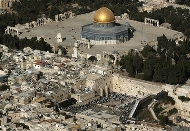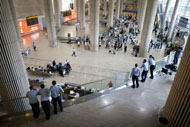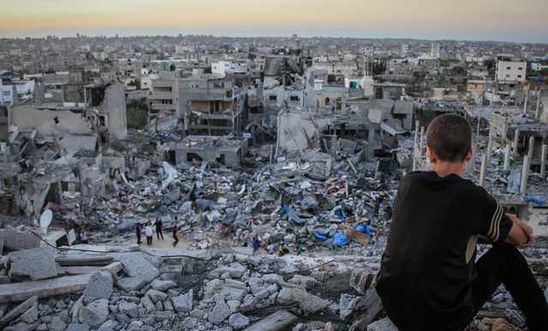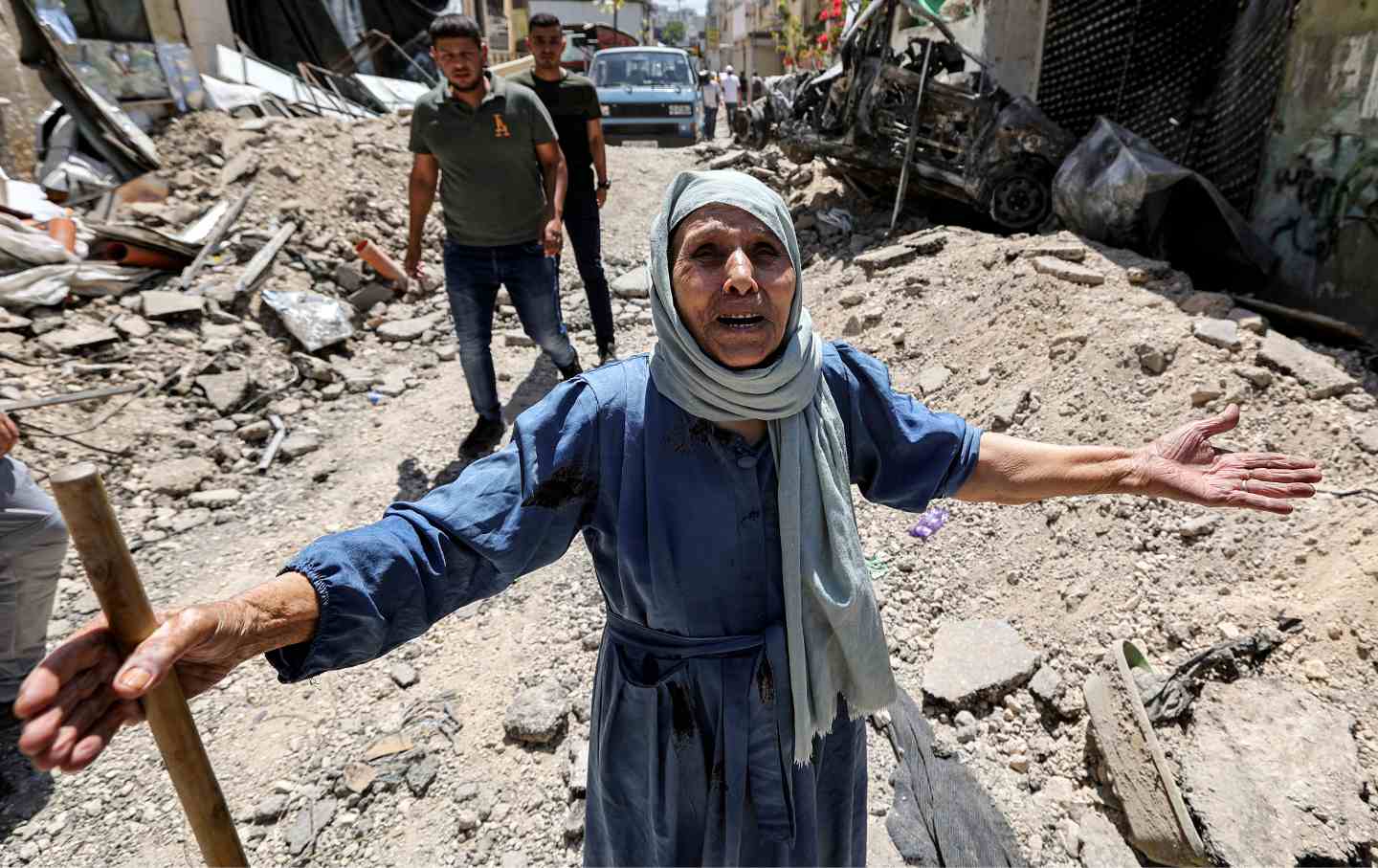For the past week, tensions have risen higher than usual in Jerusalem, possibly the most disputed city in history today. Once again, Jerusalem’s religious significance is at the heart of the conflict and has been woven into the intrinsic political complexities that define this troubled slice of the world.
Recently, Israel announced it intended to carry out excavations at the Magharba (Dung) Gate of the Old City, which leads to the Aqsa Mosque Compound. According to Israeli officials, the work is routine renovations of a bridge constructed at the Magharba Gate that connects the so-called Western Wall to the Aqsa Mosque Compound. Palestinians say the elevated tunnel is built over a hill under the jurisdiction of the Waqf Authorities (the Islamic endowment that oversees the compound), under which there is Islamic archeological ruins. The Palestinians also claim the bridge is being built in order to give Israeli police and the army direct access to the Aqsa Compound to enable it to raid the area with more ease. The dirt hill, which is being torn down by Israeli authorities is also a main supporting wall to the compound, say Waqf officials and therefore threatens the destruction of the Aqsa’s very foundations.
There have been years of bitter dispute over this piece of land in the center of Jerusalem’s Old City, sacred to Muslims all over the world. The Aqsa Mosque and the gold-plated Dome of the Rock is the third holiest place of worship to the Muslims, where it is said that Prophet Mohammed ascended to heaven on his winged horse Buraq. Hence, the name of the western wall, which Muslims call the Buraq wall, to which the prophet was said to have tethered the magical horse.
Jewish tradition tells another story, claiming the wall is the last standing edifice remaining from the destroyed Second Temple and is therefore sacred to the Jews.
The Magharba Gate, which doubles as a gate in the Old City and also a direct door to the Aqsa Mosque Compound, opens up into the plaza that now houses the Western Wall, used exclusively by Jews. That entire area was once known as the Magharba (Moroccan) Quarter, named appropriately after the Moroccan pilgrims who flocked to Jerusalem after its conquest by Saladin (Al Ayyoubi) between 583-1187. After the Israeli occupation of Jerusalem following the 1967 War, Israeli authorities demolished the quarter, leveling it entirely and turning into what is today the Western Wall plaza.
Since then, Palestinians have accused Israel of tampering with the foundations of the Aqsa Mosque Compound, carrying out excavations below ground and demolishing areas under Waqf jurisdiction, all aimed at eventually destroying the compound, over which Palestinians, Arabs and Muslims all refuse to comprise. In 1996, clashes broke out throughout the West Bank and the Gaza Strip between Israeli forces and Palestinians after Israel opened an underground tunnel beneath the Aqsa Mosque, supposedly unveiling the ruins of the temple.
When news of this most recent excavation was announced, Palestinians called for the mobilization of all Arabs and Muslims against this latest “Zionist plot” to destroy Al Aqsa. Israel went on high alert, deploying tens of thousands of police and border guards throughout the city. Heavily armed Israelis lined the narrow alleyways leading to the Compound and young, curt policemen cordoned off all of the entrances to the Mosque, banning all men (and some females) under the age of 45 from entering. Young, fervent Palestinian youths pelted the police with stones, chanting anti-Israeli slogans and police arrested a handful of defiant demonstrators. Other demonstrations broke out in the Gaza Strip and at the Qalandia checkpoint. However, barring these few minor incidents, the day continued as Israel intended. The bulldozers continue to excavate and Israel’s blueprint for a Judiazed Jerusalem comes one step closer to being realized.
Of course, there were ample condemnations of Israel’s actions throughout the Arab and Muslim world. King Abdallah of Jordan said the move could “derail” the revival of Arab-Israeli peace talks and Hamas politburo Chief Khaled Mash’al warned Israel that infringing on Muslim rights and properties could spark a third Intifada.
Palestinian-Israelis have also been vocal on the issue. “The Israeli government is again provoking the Muslim world and the Palestinian people, and is not hesitating to ignite the region on behalf of irresponsible decisions," said Arab MK Talab El-Sana. Wednesday morning Israeli police arrested Sheikh Raed Salah, head of the Islamic movement inside Israel while trying to reach Al Aqsa.
Still, the entire scenario reeks of poor performance from the Palestinian leadership and the largely desensitized and uninterested Arab and Muslim world. For one, the Palestinians have failed to realize the extent of the danger such a move poses to the religious and historical status of Jerusalem, thereby putting down their guns long enough to formulate a united strategy to confront it. Instead, the leadership and people are too engrossed in their senseless internal battles to detect where the real threat is coming from. The danger is not from this or that faction’s battling over government seats (rendered powerless by the occupation in the first place), but rather from the threat of the occupation itself.
As for the Arabs and Muslims, well, talk is cheap. One reason Israel allows itself such a free hand in its array of discriminatory and oppressive measures it executes against the Palestinians is because it knows the latter has no real support from their brethren. The most Israel may endure is some bad media, and only momentarily. It knows better than to think the Arabs will take actual punitive steps against it in protest of its injustices towards the Palestinians, because in the past, it has done much worse. Israel has killed scores of Palestinian civilians at a time, demolished hundreds of homes in a single day in Rafah and has imprisoned democratically elected parliamentarians like common criminals. Besides the mild reprimands it received from its neighbors, the Arabs have been drawn into a sort of swan dance with Israel, condemning it in public for its atrocities while shaking hands and cutting deals behind closed doors.
It is fair to say that the battle, although tinged with the influence of regional powers, ultimately lies on the shoulders of the Palestinians. If we are to save Jerusalem – Al Aqsa along with all the other Muslim and Christian sites that make this city so holy – we must remember that it is still in the clutches of our occupier. Let the destruction at Al Magharba Gate be a painful reminder that Israel will do as it pleases, as long as there is no one to bring it to a halt.
Joharah Baker is a Writer for the Media and Information Programme at the Palestinian Initiative for the Promotion of Global Dialogue and Democracy (MIFTAH). She can be contacted at mip@miftah.org










